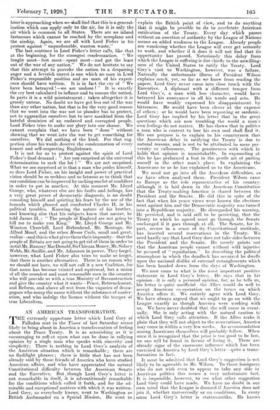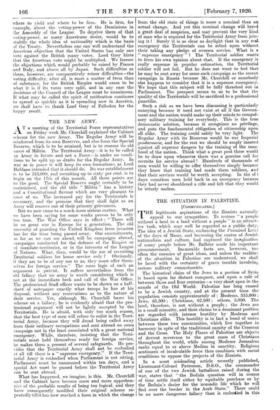AN AMERICAN TRANSFORMATION. T HE extremely opportune letter which Lord Grey
of Fallodon sent to the Times of last Saturday seems likely to bring about in America a transformation of feeling about the Peace Treaty. It is as astonishing as it is encouraging to reflect upon what can be done in rallying opinion by a single man who speaks with sincerity and simplicity. There is nothing in Lord Grey's analysis of the American situation which is remarkable ; there are no flashlight phrases ; there is little that has not been already said by those friends of America who have studied American affairs, and who have appreciated the natural Constitutional difficulty between the American Senate and the Executive. But , though Lord Grey's letter is not remarkable in itself, it is adventitiously remarkable for the conditions which called it forth, and for the ad- mirable and exceptional motives with which it was written. Lord Grey, as everybody knows, went to Washington as British Ambassador on a Special Mission. He went to explain the British point of view, and to do anything that it might be possible to do to accelerate American ratification , of the Treaty. Every day which passes without an assertion of authority by the League of Nations means an added weakness to the League. Already people are wondering whether the League will ever get seriously to work, and whether if it does it will not find that its opportunity has passed. Notoriously this delay from which the League is suffering is due chiefly to the unwilling- ness of the United States to ratify the Treaty. Lord Grey's visit to Washington, however, was a failure. Naturally the unfortunate illness of President Wilson explains much, yet, so far as we know from reading the papers, Lord Grey never came into close touch with the Executive. A diplomat with a different temper from Lord Grey's, a man with less character, would have betrayed his annoyance in all his words and acts. He would have weakly expressed his disappointment by bitterness. He would have been clever at the expense of others ; or he would have been reproving or sardonic. Lord Grey has implied. by his letter that in the great questions which are now troubling the world a man's own feelings do not matter. He has shown that in politics a man who is content to lose his own soul shall find it. His one purpose is to explain to his countrymen that the American delay in ratifying the Treaty is due to natural reasons, and is not to be attributed- to mere per- versity or callousness. The genuineness with which he holds that opinion is unmistakable. In expounding al this he has performed a feat in the gentle art of putting oneself in the other man's place. In explaining the Americans to us he has explained us to the Americans.
We need not go into all the American difficulties, as we have often analysed them. President Wilson came to Europe as the sole representative of his country: although it is laid down in the American Constitution that the Treaty-making function is shared between the President and the Senate. He did this in spite of the fact that when his peace views were known the elections went against him and the Democratic majority was turned into a Republican majority. He disregarded his warning. He persisted, and is said still to be persisting, that the Treaty to which he agreed must go through the Senate unchanged if it goes through at all. The Senate, for it part, secure in a sense of its Constitutional rectitude, has inserted several reservations in the Treaty. We need hardly say that Lord Grey does not take sides between the President and the Senate. He merely points out that the American people cannot without wild injustice be accused of " repudiation." In describing the political atmosphere in which the deadlock has occurred he dwells upon the national dislike of external entanglements which has been handed down from the days of Washington.
We now come to what is the most important positive statement in Lord Grey's letter. He says that in his opinion—it is only a personal opinion, for, as he tells us, his letter is quite unofficial—the Allies would do well to accept American co-operation on the terms on which America offers it. We entirely agree with Lord Grey. We have always argued that we ought to go on with the League exactly as though America were working with us. We have never doubted that she will come in event- ually. She is only acting with the natural caution to Which Lord Grey calls attention. If the Allies make it plain that they will not object to the reservations, America may come in within a very few weeks. An accommodation among Americans themselves will probably follow. When once it is recognized that the prize is too good to be lost, no one will be found in favour of losing it. There arc already signs of the enormous influence which has been exercised. in America by Lord Grey's letter—quite a trans- formation in fact.
It must be admitted that Lord Grey's suggestion is not likely to be agreeable to Mr. Wilson. To those foreigners who do not wish even to appear to take any side in American politics this seems a very unfortunate fact. It is impossible, however, to see what other suggestion Lord Grey could have made. We have no doubt in our own mind that the League is doomed if America does not join it, whether unreservedly or on conditions. In every sense Lord Grey's letter is statesmanlike. He knows where to yield and where to be firm. He is firm, for example, about the voting-power of the Dominions in the Assembly of the League. To deprive them of that voting-power, as many Americans desire, would be to stultify the whole idea of nationality which is the basis of the Treaty. Nevertheless one can well understand the American objection that the United States has only one vote against the British many votes. Lord Grey hints that the American vote might be multiplied. We foresee the objections which would probably be raised by France and Italy, and above all by Japan. Such difficulties as these, however, are comparatively minor difficulties—the voting difficulty, after all, is more a matter of form than of substance, for the British Empire would cease to be what it is if its votes were split, and in any case the decisions of the Council of the League must be unanimous. If what may be called the spirit of ratification continues to spread as quickly as it is spreading now in America, we shall have to thank Lord Grey of Fallodon for the happy result.







































 Previous page
Previous page